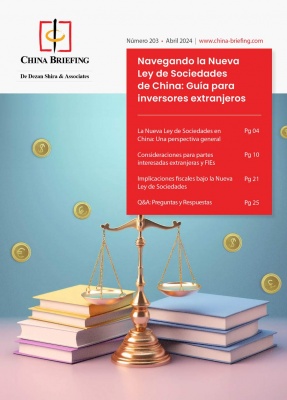Chris Devonshire-Ellis: Triggering Permanent Establishment in China Representative Offices
China-derived income key to understanding potential tax liabilities
Mar. 12 – The recent rulings by the Chinese government concerning the taxable income of representative offices in China highlights an important status position in the activities of the RO – and the question of whether an RO is in fact operating as a permanent establishment or not. The issue has wide reaching implications, as it brings many ROs into PE status and signals a clampdown by the SAT on certain activities by them.
Possibly not appreciated by many RO chief representatives is the concept of “China-derived income.” Basically this means that if an entity or person is operating a business in China, or that work is being conducted in China, then any income from that work is classified as China-derived and is subject to income tax in China. In terms of usage of ROs, many businesses and individuals have established RO and used a Hong Kong or other offshore companies (such as BVI for example) to hold the RO license. The RO is then set up, staff are employed, and work is carried out on behalf of clients overseas. Invoicing, however, is undertaken by the holding company, not the RO, and is received in foreign currency. No taxes are then paid in China.
The problem with this structure is the ruling over PE and China-derived income. Clearly, the use of an RO and a holding company to invoice for work actually carried out in China brings the activities of the RO into the remit of the SAT. Hence the interest in RO and the decision to make RO subject to corporate income tax. And the situation doesn’t end there. The SAT may also demand to see invoices issued by the holding company.
Although the financial transaction itself and the raising of invoices and receipt of payment has been carried out externally from China, the SAT may still deem that the invoices, as they pertain to “China derived income” be deemed as subject to China withholding tax. The amount of this depends upon the type of service being carried out as identified on the invoice. Typically, this is 20 percent for most services; however it can be as high as 45 percent for professional services, for example. This means, that should the SAT establish such connections, the holding company may face a bill for withholding tax on all invoices sent to its clients, and the RO may face an additional bill of 25 percent for assumed corporate income tax. Non-payment of either could result in withdrawal of licenses, fines, and litigation for unpaid tax, both in China and overseas. Late payment penalties of up to five times any amount due could also be levied.
It remains to be seen how far the SAT will go in pursuing or pressing for documentation from holding companies in Hong Kong or elsewhere. However if this is not forthcoming, the SAT may raid RO offices in China looking for evidence, or “assume” transactions have been carried out, and base a tax payment request upon certain parameters.
Interestingly, the situation in India is similar to that now insisted upon by China’s SAT. Indian Liaison Offices, if judged to have PE status, with a direct business link to a holding company established, face income tax demands of 44 percent. In insisting ROs that have PE status pay tax in China, the China SAT is only following normal global tax practice.
Chief Representatives in China concerned about such matters should read our previous article, ‘Chief Representatives May Consider Power Of Attorney In Tax Questioning.’ Businesses in China operating ROs may now need to evaluate whether or not to continue with the RO or upgrade to a proper legal entity such as a Foreign Invested Commercial Enterprise (FICE) which can be used for trading and import/export in China, or a Wholly Foreign Owned Enterprise (WFOE) which would be pertinent for some consulting firms and other businesses involved in manufacturing.
All chief representatives of ROs in China that are conducting work that can be considered as “China derived income” and are billing via a separate entity elsewhere need to reconsider the business structure they are using, evaluate any potential for tax assessment, and certainly consider upgrading their business model to FICE or WFOE structures if they are not in compliance.
Chris Devonshire-Ellis is the founding partner of Dezan Shira & Associates. The firm can assist with tax compliance issues for ROs and help deal with any potential tax problems. Please contact the firm’s national tax partner Sabrina Zhang at tax@dezshira.com for assistance. The firm also can assist with the closure of representative offices and the establishment of FICEs and WFOEs. Please contact Richard Hoffmann at legal@dezshira.com for such matters.
Chris also contributes to India Briefing , Vietnam Briefing , Asia Briefing and 2point6billion
Related Reading
SAT Increases Deemed Profit Rate For Representative Offices
China RO vs. FICE
Liquidating Representative Offices in China
Establishing FICE & WFOEs in China
 India Briefing: Setting Up Liaison Offices, Project Offices, Branch Offices, and Private Limited Companies in India
India Briefing: Setting Up Liaison Offices, Project Offices, Branch Offices, and Private Limited Companies in India
- Previous Article AmCham South China releases Special Report on the State of the Business in China
- Next Article Shanghai Expo 2010: The U.K. Pavilion
























